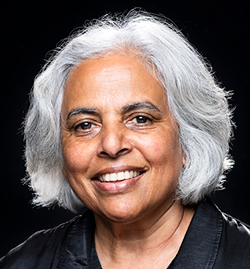Global health mentorship today: Grace John-Stewart, MD, PhD, MPH
July/August 2024 | Volume 23 Number 4
 Photo courtesy of Grace John-Stewart
Grace John-Stewart, MD, PhD, MPH
Photo courtesy of Grace John-Stewart
Grace John-Stewart, MD, PhD, MPH
Dr. Grace John-Stewart is a professor of epidemiology, medicine, pediatrics, & global health at the University of Washington.
Both my parents were physicians. They came to the U.S. from India but went back to work for many years of my childhood. In the mission hospital, I would often go and see all the different ways that medicine was able to help people. My mom's dad, also a physician, did a lot of work with leprosy when it was considered contagious. I always heard about the impact he’d had throughout India.
I went to medical school and really loved clinical medicine, loved seeing patients, and then I applied for an infectious diseases fellowship. My mentor at the time thought I should become involved in this HIV project and maybe get an MPH. Actually, I was a little reluctant! As part of the fellowship, I went to Kenya to do research. I’d trained in medicine and pediatrics, so I was seeing women and children in clinic, but then as part of the study, I was looking at the data. It really hit home how population health impacts your understanding of transmission and ways to prevent it. I ended up doing my PhD in epidemiology and now all my work is in population health and clinical research.
In Kenya I was interested in how HIV transmission occurred vertically from mother to child, our team wanted to understand whether it was
in utero, during delivery, or through breast milk. Due to research by many groups, it is now possible to dramatically decrease vertical transmission. It used to be about a 30% transmission rate and now we can almost entirely prevent transmission. As we followed children and mothers in the research projects, our team became interested in what could be done for the children who’d acquired HIV and for mothers to help with their HIV and to prevent transmission in future pregnancies. We also became interested in how to prevent women from acquiring HIV during pregnancy and breastfeeding. Other questions arose, about co-infections, nutrition, the impact of antiretroviral exposure in utero. I was supposed to go to Kenya for two years and ended up living there for 12.
Mentoring is quite different than teaching in that you get to work one-on-one. You have to understand your mentees to help facilitate their vision of what their next step will be. You might bring some experience or some wisdom, but they bring new ideas, so it’s a catalytic and synergistic process.
The mentorship I received had a profound impact on me. My primary mentor during infectious diseases fellowship, Dr. Joan Kreiss, was meticulous and detail-oriented and taught me how to build careful research and how to think about research. She saw something in me that I didn't see in myself about my potential strengths as a researcher. This was very valuable to me and encouraged me to choose this path.
How you're mentored affects how you mentor others. The one thing that makes everything kindle in a mentorship relationship is bilateral engagement. Sometimes mentees are very comfortable appealing for input, sometimes it's harder. I encourage my mentees to meet with me so we can form a closer relationship because nothing will happen without that. Some mentees are polite and don't want to “waste time,” but mentorship only works when people feel comfortable coming and just brainstorming. Culture can affect the level of engagement. In some cultures, academic programs are hierarchical; professors are harder to access and that might make it difficult for a mentee to feel they can ask questions. That cultural barrier might exist for some U.S. trainees as well.
I have been fortunate to have had extremely deep relationships with some of my mentees for many years and the back and forth has been crucial for both of us. With others, it's more superficial and has had less engagement. Mentoring can be generational as well. Sometimes a mentee will have their own first mentee and they want support from you as a co-mentor, so you provide backup.
I've mentored both men and women and been mentored by both. I think the success of the relationship is more about personality than gender. It's more about whether there is real investment in cultivating a good relationship. The person you're mentoring trusts you and you get to be a part of their scientific journey. It’s a huge privilege to be invited on that journey.
More Information
Updated August 14, 2024
To view Adobe PDF files,
download current, free accessible plug-ins from Adobe's website.
Related World Regions / Countries
Related Global Health Research Topics